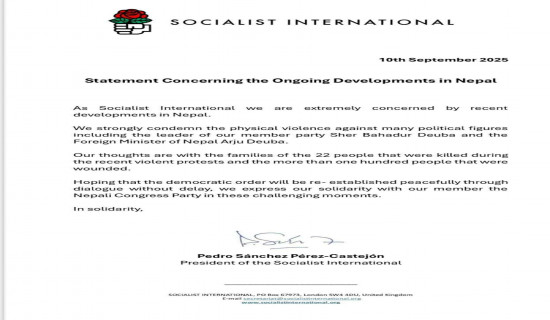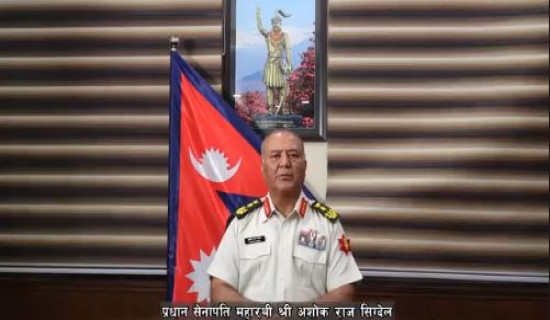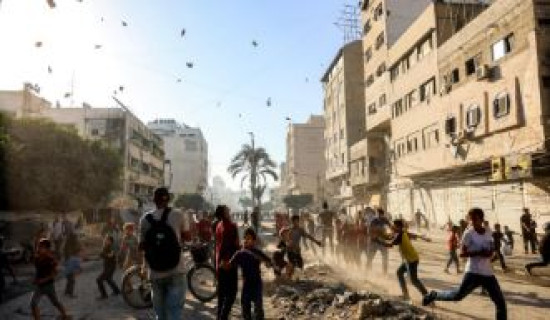- Friday, 12 September 2025
Charming Poems Of Nature Lover Poet
Nature is related everywhere. Only one should be able to link and see it in life through perception, thought, and practice. To many, who are accustomed to getting temporary relief from ailments by make-shift means, nature is only enigmatic. But to Manasagni Hari Prasad Pokhrel, nature is not only an enigmatic truth to preach; it is the fundamental subject to practice for providing services to humanity.
The note on behalf of the publisher of this under-reviewed anthology of poems entitled “Panika Rekha” mentions that Manasagni is the person who made a strenuous effort to achieve national recognition for the practice of naturopathy in Nepal. This is one remarkable point of the poet’s personality. But the other important points in this context are about his writings—poems, essays, and others.
What do scholars say about him in this book? In the opinion of Mahesh Poudyal, Manasagniji writes poems with enthusiasm to nurture values with the hopes of maintaining a balance between man and man and man and nature. The fact mentioned by Biplav Pratik is even deeper. The poems in the Panika Rekha are hard to review but are very delightful to read.
How has a firm believer in naturopathy and Yog Scholar been expressively delightful in writing poems in Nepali? Maybe Manasagniji already has a poetic heart; otherwise, such spontaneity in expression is impossible. The other supportive point for him to compose poems may be his deep inclination to study yogic philosophy, the literature of naturopathy, etc.
The words Panika Rekha, the title of the book, which means the line of water in English, are not only sweet; they are delicately symbolic, too. Poet Manasagni performs the art of poetry not only to expose social chaos but also to warn and attack evildoers and trends using artistic symbols in many of the poems in this anthology.
The collection’s 51 poems and the themes with which the poet has dealt are fresh and globally pressing. We can also classify these poems based on timeless values of human civilization, such as nature, humanity, philosophy, and the quest for truth.
There is a poem entitled “Shanti” (Peace) on page 45 where the poet glorifies the human quest for peace as the loveliest desire. Four lines of this poem from Page 46 of the book, which capture a true sense of peace, can be translated from Nepali here:
Dropped from heart to bag,
The Gita, Dhammapada, Kuran, and Bible are flowing.
In search of heart,
The Ganga flows to the ocean.
The other poem with a powerful message about the theme of truth is “Pool” (Bridge). Here the poet’s last lines of truth for mankind are:
Listen –
Man is a bridge,
He can reach God from there,
Or become only a demon.
Page, 63
No doubt, Manasagni’s inclination towards Yogic teachings is deep, but in poetic devotion, his skills and feelings are spontaneous to admire the beauty of nature. These four lines in the poem entitled “Chetana” (Conscience) explain the magnanimity of nature:
Throw stick or stone,
For apples in tree,
It never grows stone,
It gives only apples.
Page 72
The poet’s creative endeavour to drop satirical messages, too, is artistic. Here, we have a few lines from the poem entitled Sadak (Road), page 86:
Maybe it's done by
Marks of Ministry or Department
And, tie-knots or suits,
And from tears
Wavy mud puddles remain stubborn on the roads!
The poems in Panika Rekha (Line of Water) are so sweet that they only generate understandable meanings from the complicated themes of contemporary society. Even in the choice of words, the poet has been spontaneous and simple.
Similarly, the poems in this collection are artistically concise because the poet has covered up larger issues within a few lines of sweet words. And to talk about the impacts of the poetic expressions, the title of the book itself reminds us of the natural fact that water lines hold energy current, and here Manasagni is symbolically seeking the same energy to make all aware of what ails the nation and society through the medium of poetry.
Finally, to talk about the poet in the backdrop of his long contributions to writings, yoga practice, and naturopathy for health, this under-review anthology is proof that he also holds tremendous potential to decorate the domain of Nepali poetry. Kudos to the poet for this creation, and good wishes for more such poetic surprises in the days to come.
(Kafle is a former Deputy Executive Editor of this daily.)



-original-thumb.jpg)













